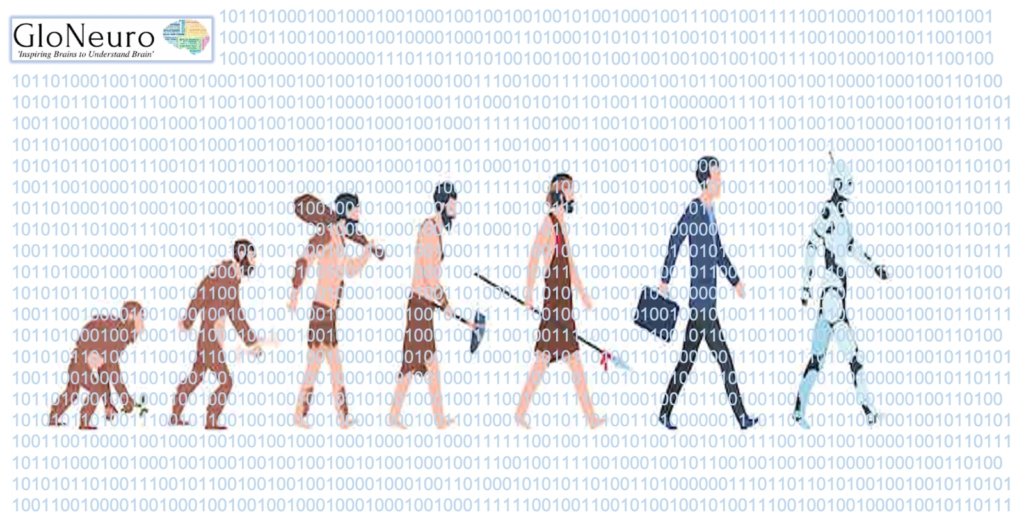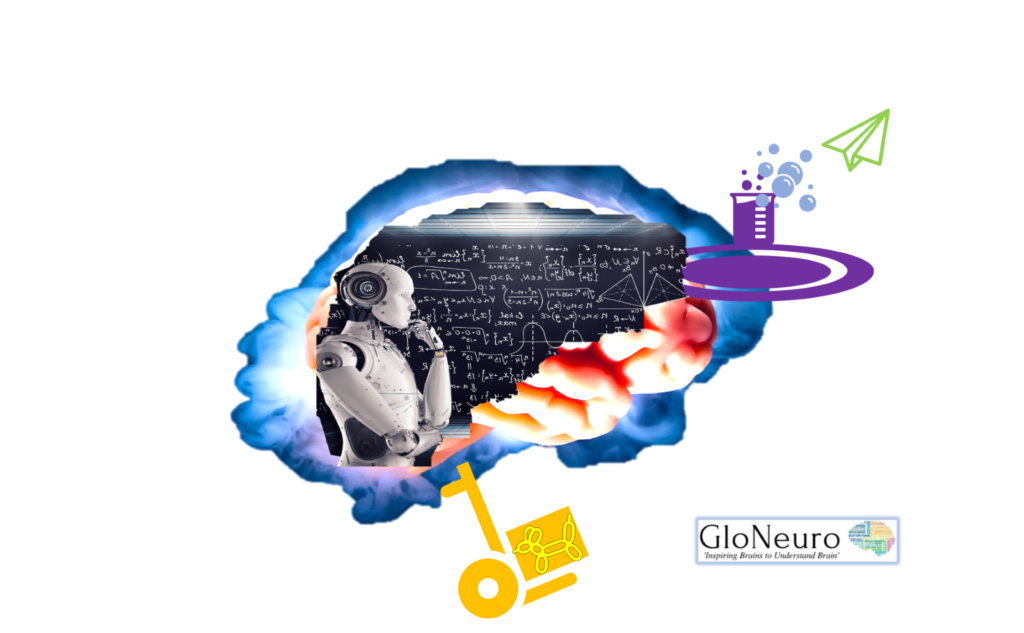May 24, 2023
Author: Paalki Sethi
Editor: Dr. Shampa Ghosh
Did you know that the way we search for information has undergone a dramatic transformation in recent years? Gone are the days of flipping through dusty old books or typing keywords into search engines. We now live in a world where artificial intelligence (AI) serves us knowledge on a silver platter, without us lifting a finger. Imagine a future where our brains rely heavily on AI tools to think, remember, and process information. It sounds like something out of a sci-fi movie, but the reality is closer than you might think. AI technology is revolutionizing our mental capabilities, shaping how we interact with the world and redefining what it means to be intelligent. Let’s dive again in this GloNeuro article.

Artificial Intelligence (AI) presents a new landscape for humanity, altering both our abilities and the consequences of our everyday actions through the innovation of digital and intelligent technology. AI impacts our behavior, which is intertwined with our intelligence—a fundamental characteristic of human beings that influences everything from our implicit survival strategies to our explicit self-concepts. Intelligence also plays a vital role in the social institutions upon which contemporary existence relies. AI encompasses a range of technologies that extend human intellectual capacities, including perception, action, categorization, and pattern recognition. Some systems, known as autonomous, can perform these tasks without human intervention, albeit only after being initiated by humans or human institutions.
Understanding the impact of AI is crucial for two reasons: empowering us to adapt to and optimize our coexistence with AI, and developing AI and AI policies that maximize societal benefits while minimizing harm. AI has been applied in various domains such as healthcare, transportation, manufacturing, finance, and more. It automates mundane tasks, reduces costs, and makes data-driven decisions. Additionally, it identifies patterns in vast datasets and generates predictions about the future. While AI offers numerous benefits, it also affects our mental capabilities and transforms our approach to tasks. Increasingly, everything is becoming automated, relieving individuals of extensive workloads and providing instant results.
Previously, when people wanted to learn something, they relied on books and texts for answers. Then came the era of web search engines, where we turned to find information. Now, in the age of AI, even the use of search engines has become effortless. AI tools provide everything on a “silver platter,” eliminating the need for personal effort. This technology, akin to a “silver platter,” impacts our mental capabilities in various ways. Our brains consist of neurons that form synapses to communicate and carry out specific tasks, with each region assigned a particular role. For instance, consider the brain region responsible for memory and critical thinking. AI tools can manipulate the role of this region by reducing our need to process information and think critically. Consequently, our brain’s plasticity is affected, compromising our ability to memorize and think effectively in the future.
Machine learning, a prominent aspect of AI, poses potential risks to human skills. Although the human brain is highly adept, excessive reliance on AI tools can diminish our mental capabilities, turning us into mere tools dependent on higher commands. Our remarkable capacity for knowledge and skills may be limited by technology and AI, hindering these exceptional traits.
On the brighter side, AI can enhance human mental capabilities if used beneficially and without undermining our innate capacities. Firstly, it can reduce cognitive load by taking on tasks that would otherwise burden humans, freeing up mental capacity for creative pursuits. Secondly, AI can enhance accuracy and speed, swiftly processing information and saving time and effort. Thirdly, AI can foster human creativity by generating ideas and encouraging thinking outside the box. Lastly, AI can mitigate the risk of errors by detecting and alerting humans to mistakes in data. Therefore, the potential advancements and benefits of AI for human mental capabilities can be realized through a balanced integration of AI technology with human interaction, ensuring that our mental faculties remain intact and empowered.
Excessive usage of anything has the potential to yield negative effects, and this truth extends to the world of AI. While AI has the capacity to enhance human mental capabilities, it also presents challenges that must be addressed. One major challenge is the potential for bias in AI systems. These systems rely on data, and if that data is biased, the outcomes will reflect that bias. Another challenge is the potential for AI to replace humans in certain tasks, leading to job losses and decreased demand for human labor. Additionally, AI systems are intricate and difficult to comprehend, which can undermine trust and confidence in their results. The ideas surrounding AI do not exist in isolation but are interconnected with scientific and philosophical communities. Some believe that AI will eventually replicate human consciousness, while others doubt that humans will ever develop AI equivalent to the human mind.
Despite the ongoing advancements, no machine has yet achieved the level of cognitive ability possessed by a human being. The lack of a universally accepted definition of intelligence remains a significant hurdle. AI is an evolving science without a standardized definition or set of rules applicable to every problem. Furthermore, its widespread implementation will take time as extensive research and development are still required.
So, we can conclude from this GloNeuro article that while AI holds immense potential, its challenges and complexities highlight the need for careful consideration and continued exploration to harness its benefits while mitigating its drawbacks.
References:
- Anderson, J., Rainie, L., & Luchsinger, A. (2018). Artificial intelligence and the future of humans. Pew Research Center.
- Atika, A., Kusumawati, A., & Iqbal, M. (2018). The effect of electronic word of mouth, message source credibility, information quality on brand image and purchase intention. EKUITAS (Jurnal Ekonomi dan Keuangan), 20(1), 94–108.
- Bryson, J. J., & Theodorou, A. (2019). How society can maintain human-centric artificial intelligence. In M. Toivonen-Noro & E. Saari (Eds.), Human-Centered Digitalization and Services (pp. 305-323). Singapore: Springer.
- Huete-Alcocer, N. (2017). A literature review of word of mouth and electronic word of mouth: Implications for consumer behavior. Frontiers in Psychology, 8, 1256.
- Waytz, A., Heafner, J., & Epley, N. (2014). The mind in the machine: Anthropomorphism increases trust in an autonomous vehicle. Journal of Experimental Social Psychology, 52, 113–117. https://doi.org/10.1016/j.jesp.2014.01.005
Recent Articles
.



